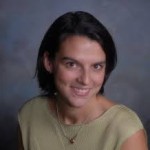Executive Director of the Division of Teaching and Learning Technologies Jesse Stommel and Digital Knowledge Center Director Martha Burtis’ recent EdSurge.com interview on Critical Digital Pedagogy was discussed on the Connected Teaching and Learning Blog. The author shared highlights from the interview, specifically focusing on their views on grading in the classroom. Read more.
- Jesse Stommel, Senior Lecturer of Digital Learning
- Director of the Digital Knowledge Center Martha Burtis


